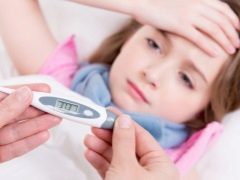Psychosomatic causes of fever in children and adults
Very often the temperature in adults and children rises for no reason, while the throat does not hurt, there is no cold, but the thermometer shows an increase in body temperature. In this case, experts say about the fever on the nerves of the soil, more precisely, about the psychogenic rise in temperature.
General information
A rise in body temperature is a defense mechanism that the body activates during a period of viral or bacterial disease. It is necessary, because at elevated temperatures, the environment inside the human body becomes less “attractive” for disease-causing organisms and viral agents, and heat stimulates the production of protective cells of the immune system, in particular, interferon.
The more of this protein, the faster the immune system manages to deal with unwanted "guests" and return to normal.
Normally, the body temperature of a healthy adult or child ranges from 36 to 37 degrees. Its low-grade fever is called an increase from 37 degrees, and a high temperature - from 38 degrees and above.. There are people with individual physiology, for whom lower temperatures are considered everyday - from 35.3 to 35.8 degrees, or they have a low-grade fever that is constantly present, but they also feel great.
An increase in body temperature relative to the normal norm is perceived and felt by a person differently. Most often there is a weakness, body aches, headache, there is a feeling of chills, dizziness, a painful sensation in the eyes.
If there are signs of an acute respiratory viral infection, flu or another disease, a rise in temperature will be an important diagnostic sign when assessing a patient’s condition. If there are no other symptoms and, besides fever, nothing happens, special attention should be paid to the psychosomatics of this condition.
Psychosomatic causes
Psychosomatic fever of the body by psychotherapists and psychologists is regarded as the body’s individual response to stress experienced or experienced. Experts tend to see "escape" at such a temperature. A person subconsciously or consciously tries to hide in a disease, hide behind it. But there are no objective physiological reasons for the disease, so the body creates the only obvious symptom that will allow a person to consider himself ill, temperature.
A person may need a disease in order not to do something that is to be, but causes fear and insecurity. The temperature will help you stay at home, get sick leave, legally you can refuse to do something that is so embarrassing or scary. A child's sudden temperature may appear on the eve of an important exam or competition.if he feels that he is not sure about the positive outcome of the test. Often these “shoots” are made by small children who very much do not want to go to the kindergarten or go to visit their grandmother.
The second reason for the psychogenic temperature increase is the utilization of negative accumulated energy. Tsuch fever develops after an important or unpleasant event, when a person is full of unpleasant feelings, unexpressed fears, doubts, and maybe resentment. Like all obsolete, such destructive, already obsolete emotions should be disposed of. The body arranges their “crematorium” - as a result, the body temperature rises.
In this situation, the body, in fact, has two choices - hysterics or fever. If a person does not know how to express his feelings in words, he has no one to share the experienced events, there is not a sufficient degree of trust to tell his relatives how they feel, the fever begins. More open people start crying, tears, hysterics - this is the way emotional “trash” is brought out without any other consequences for the organism.
Psychogenic temperature can rise in people with a labile psyche, heightened emotionality and sensitivity, almost all children are subject to it due to the age characteristics of the nervous system.
Chronic fatigue syndrome and some depressive states accompanied by subfebrile temperature are more common for people who are used to not showing their true feelings to others. They usually always have a fairly high temperature.
The psychology of the disease, more precisely, of the condition, is such that it directly indicates adaptive difficulties, therefore in children, psychosomatic fever may appear suddenly in response to a change in familiar surroundings (the family changes its place of residence, the child was sent to kindergarten, to school, transferred to another children's institution). Typically, this temperature drops and comes to normal values immediately after the child is in a familiar environment or adapts to new conditions.
How to cure?
Special attention should be paid to the treatment of such a temperature, because in this case there is little hope for antipyretic drugs - they either do not help or help, but not for long, and the fever reappears. Treatment requires the right approach, taking into account the possible cause of the disease.
Well-known researchers point out that a sudden fever may be caused by an outburst of indignation, anger. Louise Hay proposes to master the techniques of managing your own anger, to forget once and for all about psychogenic fever. Canadian researcher fully agrees with her. Liz Burbo. She clarifies that such a temperature is a clear signal that there is some kind of problem that a person needs to quickly understand and solve., stop running and hiding from her.
Treatment should begin with finding a problem. It is necessary to relax and honestly answer the question why a person is trying to escape, what he doesn’t want to do, why the disease was created. You also need to clarify whether there is someone strong anger and irritation. The responses received will be a therapeutic assignment.
Having anger means you need to let it go., forgive the offender, thank your body for the hint and tune in to positive emotions (even if you can find a huge amount of good features and merits in the image of the offender). In this case, the temperature will fall within a few hours.
There is an unwillingness to perform some kind of assigned work - it is worth calling colleagues and honestly abandoning it.referring, for example, to the fact that our own forces were overestimated. After that, it will become noticeably lighter, and the heat will begin to subside.
If the psychogenic temperature rises in a child, then you need to ask him where and why he does not want to go.. It is possible that in the kindergarten someone offends him, so the prospect of going there again for a child is unpleasant. It would be a good idea for a schoolboy with a sensitive and sensitive psyche to organize preparation for tests and exams in such a way as to manage everything without any trouble, in a quiet manner, well in advance. Then self-confidence will be greater, and the child will not need to create a “runaway into illness”.
If the body temperature reacts to certain stressful events and troubles, then you should “insure” yourself beforehand - master relaxation techniques, sign up for a massage and a pool, so that the release of negative emotions occurs on the physical level as emotions accumulate, it is important not to overflow.
Thus, such temperature practically does not need medicines.In addition, it is easier to prevent, if you know why and how it occurs.
If you start “suppressing” the fever with large doses of antipyretic, the true problem will remain unresolved, and if necessary, everything will happen again, but this time the heat may be higher and the condition will worsen.















